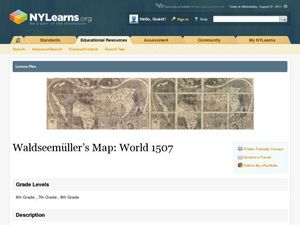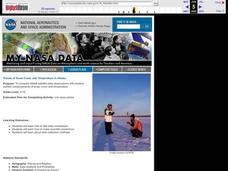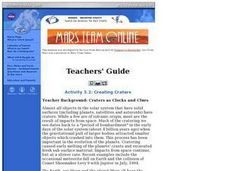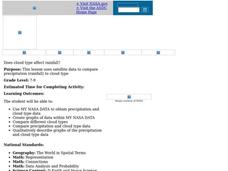Curated OER
Waldseemüller’s Map: World 1507
Middle schoolers take a closer look at historical maps. In this primary source analysis lesson, students examine the first world map produced by Martin Waldseemuller. Middle schoolers complete the included map analysis worksheet and then...
Curated OER
Trends of Snow Cover and Temperature in Alaska
Students gather historical snow cover and temperature data from the MY NASA DATA Web site. They compare this data to data gathered using ground measurements from the ALISON Web site for Shageluk Lake. They graph both sets of data and...
K12 Reader
Meteorologists
Meteorologists and the tools they use are the subject of a reading comprehension worksheet that asks kids to read the attached article and respond to a series of comprehension questions.
Curated OER
Differences Between Ground and Air Temperatures
Students examine the differences between air temperature and ground temperature. In this investigative instructional activity students find NASA data on the Internet and use it to create a graph.
NOAA
Technology I
Isn't technology great? The 12th installment of a 23-part NOAA Enrichment in Marine sciences and Oceanography (NEMO) program introduces technology that marine scientists use. Pupils take part in an activity using conductivity,...
Curated OER
Plate Tectonics Day 3 Sea Floor Spreading: Evidence for Continental Drift
Learners are introduced to Sea Floor Spreading and how it provides evidence for Hess's and Deitz's theory of Continental Drift. They use paleomagnetic data to calculate the rate of Sea Floor Spreading.
Curated OER
Observation and Inference
Assess your young scientists' understanding of the difference between observation and inference with this 20-question multiple choice quiz. It reviews a variety of physics and astronomy concepts, such as solar eclipses and sunspots, the...
Centers for Ocean Sciences
Ocean and Great Lakes Literacy: Principle 7
Your mission, should you choose to accept it, is to take your class on an underwater adventure. The final installment in a seven-part series involving salt and freshwater bodies takes junior oceanographers below the surface in...
Montana State University
Who’s on Top?
What's it like to climb Mount Everest? An educational resource encourages an in-depth knowledge of Mount Everest's scientific missions through a variety of activities, including an analysis of maps, a KWL chart, videos, a simulation, and...
Curated OER
Namib From Space
Students view photos of the Namib Desert from space as they appear on the World Wide Web. They study the photos and identify landmarks from space as they examine how to collect information from the Internet for a class presentation.
Curated OER
Alice World:Tornado
Seventh graders use the Alice program and complete a world that is damaged after a tornado. In this atmospheric conditions lesson students complete an activity using the Alice program.
Curated OER
Space Shuttle
One slide details the features of Space Shuttle Discovery in graphic form. Another shows a faulty hydrogen fuel sensor. The final slide is a picture of the explosion of Space Shuttle Challenger and the ill-fated crew. If you wanted to...
Curated OER
1492: Using Data to Explain a Journey
Students examine how Christopher Columbus made his way across the Atlantic. In this data lesson students use an Internet program to navigate like Columbus.
Curated OER
March of the Polar Bears: Global Change, Sea Ice, and Wildlife Migration
Students study global change and how these changes impact wildlife. In this polar bears lesson students analyze maps and data to understand climate change.
Curated OER
NUMB3RS Activity: Implicit Orbits
For this algebra worksheet, students solve word problems using algebraic equations and implicit differentiation. There are 16 problems dealing implicit differentiation.
Curated OER
Analysis of Atmospheric Conditions for a High Mountain Retreat
Students examine the relationship between altitude, atmospheric pressure, temperature and humidity at a particular location. They practice science and math in real world applications. They write reports detailing their scientific...
Curated OER
High Mountain Retreat
Students explore and analyze atmospheric conditions for a high mountain retreat. They examine the relationship between altitude, atmospheric pressure, temperature and humidity at a particular location. In addition, they write reports...
Curated OER
Creating Craters
Students explore parts of an impact crater and compare and contrast craters found in Earth, the Moon, and Mars. Crater formation is modelled and the relationship of mass, velocity, and size of the projectile to the crater formation is...
Curated OER
Does Cloud Type Affect Rainfall?
Student uses MY NASA DATA to obtain precipitation and cloud type data. They create graphs of data within MY NASA DATA. They compare different cloud types as well as precipitation types. They describe graphs of the precipitation and cloud...
Curated OER
Using Vegetation, Precipitation, and Surface Temperature to Study Climate Zones
Middle schoolers begin their examination of the climate zones found around the world. Using a software program, they identify the relationship between the vegetation, climate and temperatures of the different zones. They also plot...
Curated OER
Ecosystems Connect
Students investigate ecosystems near their school and across the world. They examine both living (biotic) and non-living (abiotic) elements of each. They recognize ecosystems from various continents around the globe. The use of computers...
Curated OER
Impact Craters: Holes in the Ground!
Students simulate crater formation through a lab activity. In this space science lesson, students calculate how much energy is transferred during meteorite impact. They identify different factors affecting the size and depth of craters...
Curated OER
Using the News in Class
Students listen to international news stories. Students use context clues to determine the meaning of vocabulary words from context, then complete a matching exercise to see if their vocabulary definitions were correct. Students...
Curated OER
Gettysburg Rocks Recycle to Win
Eighth graders use a geologic cross section to study the rock cycle of the Gettysburg battlefield. For this rock cycle lesson, 8th graders connect the rock cycle and continental rifting.

























